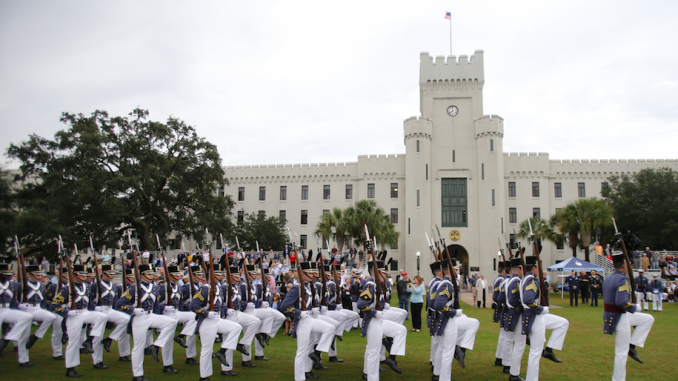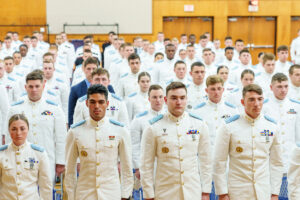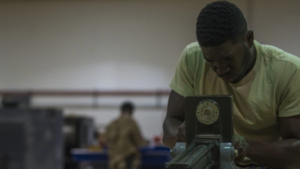
As seen in The Charlotte Observer, by Vanessa Infanzon
The Reserve Officers’ Training Corps is a military officer training program available in 275 colleges across all 50 U.S. states and territories.
Army is the largest of the ROTC programs, but there are Navy and Air Force programs, as well. Between 5,00 and 6,000 officers are commissioned each year through the Army ROTC program.
“ROTC is where Army officers come from,” said The Citadel Recruiting Operations Officer Joshua Nelson. “We’ve been doing it since 1916.”
Interested in how ROTC programs work? Here are answers to frequently asked questions:
How do I apply for an ROTC program?
Students apply for the Army ROTC, for example, through its website here. High school students can apply after June 30 of their junior year. The window for applying is only open for a specific length of time; check the website for cutoff dates.
Nelson suggested reaching out to the recruiting operations officer at the nearest college or the school where the student has an interest in attending. He said, “Start that relationship early in the application process.”
The ROTC application process has three parts – online form, physical fitness test and interview. If eligible, students have the option to apply for a National Board College Scholarship.
“We have scholarships linked to STEM (science, technology, engineering, math) majors,” The Citadel Lieutenant Colonel Whit Jones said.
Does it help to have experience in Junior ROTC?
According to Nelson, involvement in Junior ROTC in high school is something to add to the leadership portion of the ROTC application, but it doesn’t necessarily help a student gain a spot in an ROTC program.
“Junior ROTC definitely gives an individual a foundation, but it’s no different than Boy Scouts of America, Civil Air Patrol, Girl Scouts or any other leadership experience,” Nelson said.
What do ROTC programs look for in prospective students?
Students applying for ROTC programs will be asked to add community activities, volunteer experience and academic and athletic achievements to their applications. ROTC recruiters are looking for students with leadership experience in student government associations or other clubs or organizations.
“We look at the whole person – scholastic achievements, athletic accomplishments plus leadership experiences,” Nelson said. “Obviously with scholastic accomplishments, we look at grades. We look for a well-rounded individual who’s taking AP [Advanced Placement] classes, International Baccalaureate, honors classes.”
What types of classes do students take in an ROTC program?
One-credit introductory ROTC classes are open to all students at colleges where they’re available. The topics include basic level military science and customs and courtesies of the military.
Students in the ROTC program take one and two-credit classes about goal setting, leadership, tactics and operations throughout their four-years in school.
“We have a class portion, and we have a hands-on leadership lab,” said UNC Charlotte Recruiting Operating Officer Rick Nash. “We’re going to enhance and develop leadership skills. Primarily, focusing a lot on time management, stress management, physical and mental fitness and how to delegate.”
What does an ROTC scholarship cover?
ROTC scholarships cover tuition and fees or room and board – students and their families decide which package makes more financial sense. Students also receive a book and uniform allowance. A stipend is paid to students, starting at $300 a month as freshmen and increasing to $500 per month by the time they are seniors.
What does the ROTC program require while in college?
Students on a commission path or on scholarship will complete 18 academic hours by graduation. Depending on the school, some of those classes may fulfill elective credit requirements.
Scholarship students are expected to participate in the physical fitness program three times a week. They also have a two-hour leadership lab weekly. Students are involved in a training exercise in the field two to four times a year.
What happens after graduation?
In the Army ROTC, “Once the degree is conferred and the student has met all the requirements, they will commission as a second lieutenant in the United States Army, which is the most momentous thing we do,” Jones said. “It’s our entire purpose to commission second lieutenants and principle leaders, so that’s a very special day.”
After commissioning, officers proceed to their officer leader course, where they can continue to develop their leadership skills.
Some colleges host the ROTC programs, and others are linked up with them as partnership programs based on geographical area, so make sure to ask questions about particular schools and requirements.
North Carolina schools offering ROTC are:
Appalachian State University
Campbell University
University of North Carolina-Chapel Hill
University of North Carolina-Charlotte
Davidson College
Duke University
Elizabeth City State University
Methodist University
Fayetteville State University
North Carolina A&T University
East Carolina University
University of North Carolina-Pembroke
Wake Technical Community College
North Carolina State University
St. Augustine’s College
University of North Carolina-Wilmington
Wake Forest University
South Carolina schools offering ROTC are:
The Citadel
Clemson University
Presbyterian College
University of South Carolina
Coastal Carolina University
Francis Marion University
Furman University
Newberry College
South Carolina State University
Wofford College

 Top ROTC cadets recognized at The Citadel for 2023-24
Top ROTC cadets recognized at The Citadel for 2023-24 “The Citadel sees the value in the veteran experience”: Meet Air Force veteran student Quinton Glover
“The Citadel sees the value in the veteran experience”: Meet Air Force veteran student Quinton Glover “The Citadel offered me a community when a community was what I needed”: Meet Navy veteran student Langley Brimm
“The Citadel offered me a community when a community was what I needed”: Meet Navy veteran student Langley Brimm

